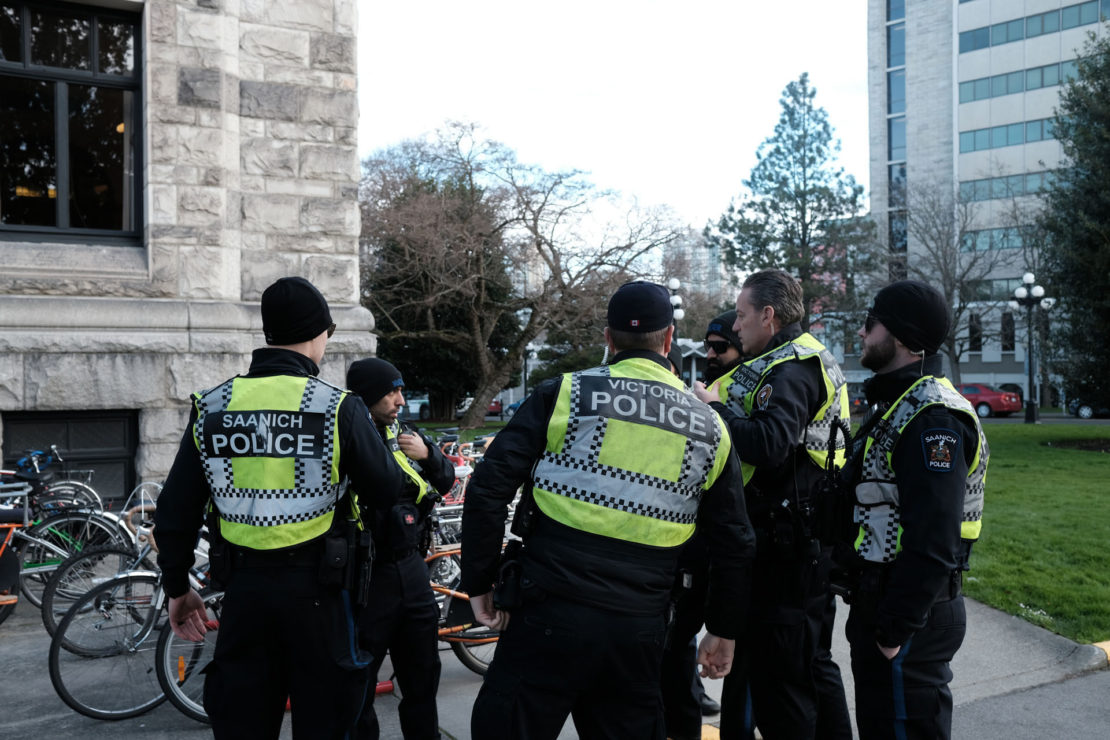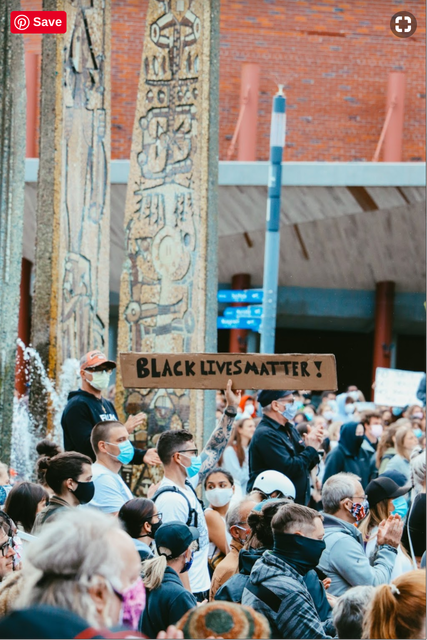Provincial government reviewing Police Act, Victoria City Council looks to change VicPD, while UVSS pressures Saanich to dismantle police department

With pressure mounting for governments around the world to take action on police brutality following the death of George Floyd, B.C.’s provincial government has promised to review the Police Act and look at reducing the roles and responsibilities placed on police departments. Victoria City Council, meanwhile, has directed staff to look into developing an alternative response to the policing of issues surrounding mental health and drug addiction. They also recently voted unanimously to ask VicPD to end the practice of street checks and carding.
While the province and city council are looking at making adjustments to the way police operate, other groups such as the University of Victoria Students’ Society (UVSS) would like to see a wholescale dismantling of the current police structure and its replacement with “community-based law enforcement” — a move which would also see funds allocated towards initiatives that support mental health and substance abuse resources.
VicPD, meanwhile, are looking at developing their own mental health response program, which could see police officers embedded into multidisciplinary expert teams similar to the already existing Integrated Mobile Crisis Response Team (IMCRT) and Assertive Community Treatment (ACT) teams.
Reviewing the Police Act
On June 12, Premier John Horgan announced that the province would be undergoing a thorough review of B.C.’s Police Act. The current 1996 version outlines the structure, roles, and responsibilities of municipal police forces as well as the RCMP in the province.
This review will take place under the purview of Minister of Public Safety and Solicitor General Mike Farnworth, who has stated that he will be forming an all-party committee which will engage with communities and experts. According to Farnworth, the goal of the review will be to modernize the Police Act, give police departments a clearer idea of their roles in their communities, and make sure there is a strong level of accountability required for police to be unbiased and fair in their conduct.
“There’s a range of other challenges that we have that we are now burdening law enforcement officers with,” Horgan said. “So when I hear people talking about defunding I think that simplifies a very complex series of issues.”
On July 8, the province announced that the committee will include NDP MLAs Nicolas Simons, Gary Begg, Bowinn Ma, and Rachna Singh, as well as Liberal Party MLAs Jas Johal, Mike Morriss, Elis Ross, and Michele Stilwell. Interim Green Party leader Adam Olsen will also be a member of the committee while Simons will serve as chair.
The committee will review and consider changes to oversight, transparency, funding, and training of police as well as how mental health and wellness, addictions, and harm reduction are handled. The committee aims to discover how deep systemic racism runs within police departments and the provincial RCMP, and will make sure that changes are made to bring the Police Act in line with the United Nations Declaration on the Rights of Indigenous Peoples (UNDRIP).
The ways in which police deal with mental health crises in Canada have been under heavy scrutiny and protest in recent months due to ongoing instances of beatings and fatal shootings during wellness checks carried out by police officers. The victims of police brutality in Canada have also disproportionately been BIPOC. For instance, Chantel Moore and Regis Korchinski-Paquet who were both shot and killed during wellness checks. This has led to calls to defund and abolish the police in British Columbia and across Canada.
Horgan said that current funding for social services such as mental health and addiction support needs to be increased and the Police Act is outdated. He added that calls to defund the police and funnel their funding into social services is too “simplistic” an approach for what he says is a complex issue.
“There’s a range of other challenges that we have that we are now burdening law enforcement officers with,” Horgan said. “So when I hear people talking about defunding I think that simplifies a very complex series of issues.”

Looking For An Alternative Response
While the provincial government is looking to work within an already existing framework, Victoria’s City Council is looking to provide an alternative that will address some of the current issues with policing while also leaving room for police departments to remain intact and serve their primary role of law enforcement.
In a council meeting on June 25, a motion was passed to have staff look at developing an alternative response to policing for addressing mental health and addictions crises. This would replace the need for police to be the ones addressing social service calls.
“We’re looking at a mobile, community based crisis program to employ first responders, that are not police, to address disturbances where crimes are not being committed,” said Councillor Sarah Potts in an interview with the Martlet.
“Everybody in our community knows that there are gaps in service and that there are problems with sending police to address things that aren’t crimes.”
As for models, Council is looking to the Crisis Assistance Helping Out On The Streets (CAHOOTS), a mobile crisis intervention program based in Eugene, Oregon. They are also looking at the Community Wellness Task Force, which is comprised of marginalized members of the community and focuses on prevention, education, and advocacy around mental health and addiction crises in Victoria.
Although funding will initially come from the remaining Community Wellness Task Force budget, where it will come from in the long term is yet to be decided. Potts says that the council will be looking at possible reductions in the budget allocation to parks and bylaw. Reductions in the VicPD budget is also a possibility. However, Potts says the important step at this stage is to establish what the program will look like.
“[VicPD gives] us a brief estimate of what they might spend [in] a year on mental health issues which is about $800 000,” said Potts. “So there’s potentially an avenue there, although this will be a growing model, something that will need to be established. Really what’s more important is establishing this program and securing it in the budget.”
Potts stressed that this program will be about addressing some of the gaps in the current system as well as the harms it causes. Potts also disagreed with the position often espoused by police departments that, due to the Mental Health Act’s ruling, police are the only ones who can apprehend people and as such they are also the only ones who can respond to mental health calls.
“We hear often, ‘oh, the police are the only ones who can apprehend people under the Mental Health Act, so in fact they have to go’ but in other places it doesn’t happen like that,” said Potts. “If in fact we’re sending a mental health worker to the person in distress, there’s no need to apprehend them in the first place.”
For Potts, the actions taking place around the world as well as the constant reports of police killings are indicative of the sorts of changes that need to take place, particularly around how mental health crises are dealt with.
“Everybody in our community knows that there are gaps in service and that there are problems with sending police to address things that aren’t crimes,” said Potts. “This is really an opportunity for us to reimagine the way that we deal with community crisis and I think that is the conversation we should be having.”

Ending Street Checks at VicPD
On July 16, Victoria City Council unanimously passed a motion that may end the practice of street checks and carding. Street checks are defined as the stopping of an individual by police for reasons not related to a crime or investigation. Carding is the practice of recording an individual’s personal information into the police database during a street check.
The motion asks the Victoria and Esquimalt Police Board to ban police checks and carding by the VicPD. The motion, however, is merely an ask. According to the B.C. Police Board handbook, the police board is also limited — they are not to “direct the Chief with respect to specific operational decisions or with respect to day-to-day operations of the Service.”
“Whether police [are] carding or doing the street checks, the police are stopping people in public and demanding their personal information with no criminal or no suspicion, or no incident,” Councillor Sharmarke Dubow, one of the principal sponsors of the motion, in an interview with the Martlet. “[It is] not acceptable and this discriminatory practice must end.”
Dubow is not alone in his support of this motion. Activists have long protested against the practice of street checks by police officers, calling them a discriminatory invasion of privacy. In Ontario, an independent review found street checks have negative physical and mental health effects on those carded, and contribute to an overall distrust of police.
VicPD has frequently defended the practice of street checks, citing their 2017 data. The data appears to show that 10 per cent of street checks were on BIPOC community members, despite BIPOC community members making up roughly 18 per cent of Victoria and Esquimalt residents.
Dubow expressed his doubts about data used by VicPD to claim that the department does not have issues with racial discrimination when it comes to street checks. He says a January 2020 report raised doubts about the data collection methods.
“Unfortunately, the same report says the data is flawed and has integrity challenges. Also it outlines how the officers don’t know what the terms mean and don’t know how to record information, and what to record,” Dubow said. “We can’t use that report.”
Council also asked for more information from the province on their next steps in the promised review of the Police Act. Dubow hopes that council can work together with the province to end discrimination within police departments and that he is looking forward to discussing their next steps.
“I hope to also bring forward how we can improve people’s lives to make sure everyone has the same access, same opportunity to dignity [and] wellbeing, and to put an end to discriminatory practices,” said Dubow.
The Push for Community Policing
Despite these actions by the federal and municipal governments, the UVSS is saying that reform will not make the changes necessary to end systemic racism within police departments. At a board meeting on June 29, a motion was passed which asked for the UVSS Board of Directors to send a letter to the Saanich Police Board “calling for the disbandment of the Saanich PD and it’s replacement with community-based law enforcement.”
The UVSS’s Director of Outreach and University Relations, Sarina de Havelyn, said that this move is necessary in order to fund social support initiatives, as well as create a safer community.
“We’re asking for the disbandment of the Saanich PD both through provincial and municipal lobbying and then we’re wanting to reallocate those funds to community supports for mental health resources, substance use resources, housing initiatives [etc]” said de Havelyn in an interview with the Martlet.
The board said during the meeting that they will not be asking for a full abolishment of the Saanich PD but rather its replacement with a more community-based and accountable service as any abolishment of a municipal police force would lead to its replacement by the RCMP.
VicPD Response
Although neither VicPD nor Saanich PD were able to respond in time for publication, VicPD released a statement welcoming Victoria City Council’s decision to look at developing an alternative response to policing mental health and addiction crises.
“I enthusiastically welcome these discussions and am looking forward to exploring new ways to approach these challenging issues. I have long supported the need for effective and well-funded social support services in the community,” Chief Constable Del Manak said in a statement. “Often, the police are the only ones left to call in situations where a social worker or mental health professional could have been more appropriate.”
Manak, however, also remarked that any new programs must not come at the expense of police budgets. There will always be the need for officers, he says, to respond to mental health and addictions crises when there is the possibility of violence.
VicPD has also recently announced that they will be looking at establishing more programs similar to the already existing IMCRT and ACT, and have been in contact with CAHOOTS to see whether aspects of their model might work in Victoria. They have cited the success of IMCRT and ACT, which have police officers embedded in multi-disciplinary teams, and have said that new programs could follow similar models.
As for street checks, Manak defended his department’s use of the practice following the Victoria City Council’s motion. In a statement, Manak said that he does not believe his department has an issue with racial discrimination when it comes to police checks.
Manak said that he hopes that VicPD will be able to continue to undertake police checks as he sees it as essential for public safety. He does however recognize the community’s concerns and hopes to work with members of the community to improve the services VicPD supplies.






